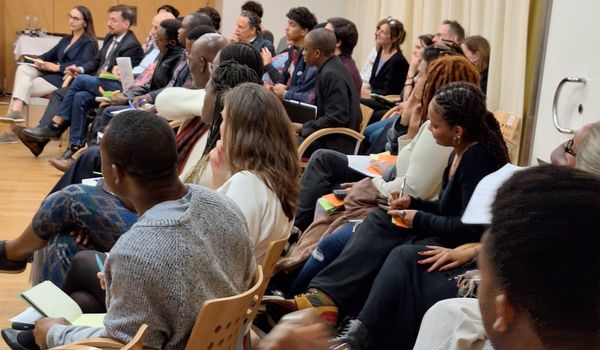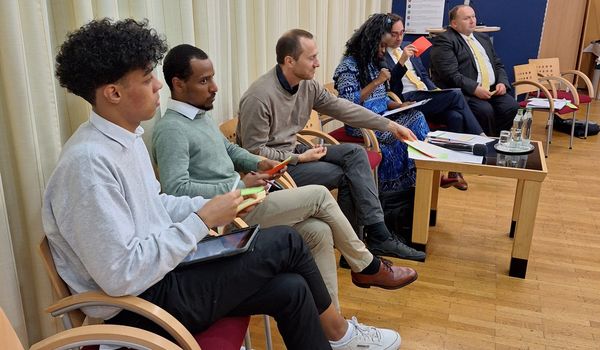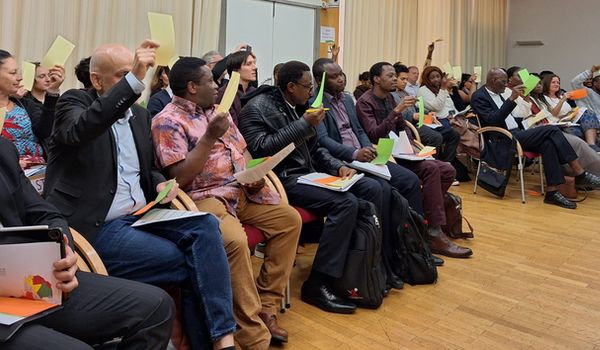The Africa Club is an informal discussion forum for people interested in African issues. Participants come from public institutions, the African diaspora, civil society, academia and the media. Topics are current developments in Africa, EU-Africa relations and the situation of the African diaspora in Europe and Austria. The goals are the exchange of information - with different backgrounds and perspectives - and the building of knowledge networks.
Shifts in the Sahel
At the much-anticipated Africa Club debate on 15 April 2024, over 50 attendees engaged in lively discussions regarding the economic and political repercussions of the recent coups in West Africa. Franz Schmidjell extended a warm welcome to the participants. He referred to the previous Africa Club about the root causes of the coups, the security situation, and the political impact.
Félicité M. Onana, the moderator,then delivered a presentation outlining the format of the discussions, which comprised three main blocs: the debate around the currency CFA Franc, the development within the mining sector, and the implication for regional alliances like ECOWAS and their relations with the European Union. She posed the question of whether transitioning away from the CFA Franc would result in positive economic and social outcomes for the CFA Franc countries.
Martin Feldkircher, Professor of International Economics at the Diplomatic Academy of Vienna,
provided insights on the currency dynamics in the Sahel. He found the monetary framework in the region both intriguing and complex. Feldkircher believed that transitioning away from the CFA Franc would require not just a change in currency but also deeper economic integration, including trade, financial flows, business cycles, and labour market mobility. However, he doubted the feasibility of achieving such integration, given the heterogeneity of the economies in the CFA and ECOWAS regions compared to the EU. Nonetheless, if ECOWAS countries pursued a common currency, Feldkircher outlined three potential approaches. Firstly, they could peg the currency to the euro. Secondly, they could opt for a free-floating currency, which could benefit exports and reduce trade deficits in case of depreciation. Thirdly, they could peg the currency to a basket of commodities ex-ported by the countries, along with currencies of major trading partners like the US, EU, and China.
The discussion on the mining situation in the Sahel commenced with an inquiry into whether recent political changes in Mali, Burkina Faso, and Niger would positively impact the region's mining sector.
Johannes Knierzinger, Senior Lecturer at the Institute for International Development,
addressed this query by highlighting the nuanced dynamics surrounding the new developments resulting from the recent coups in West Africa. Mali has passed a new mining law that will increase governmental shares, taxes and participation in the mining sector. Whether the population will benefit from this law depends to a large extent on how the government will use these new revenues. In parallel, the government has introduced a local content law that could benefit Malians more directly through job creation. But also in this case, implementation could prove difficult. In any case, these examples show that some coup leaders are at least partially following up on their anticolonial rhetoric with progressive economic policy measures, which is a cause for hope in this tense political situation.
In the third section, discussions began with a query on whether ECOWAS should wield more authority in member states to prevent coups and ensure governance stability.
Markus Reiterer, from the Africa Department in the Austrian Ministry of Foreign Affairs,
emphasized that achieving a peaceful and prosperous Africa is not only crucial for the continent but also in the shared interests of the European Union. However, recent years have seen a concerning trend of coups and instability, extending beyond Mali, Burkina Faso, and Niger to other parts of Africa. The prevalence of instability, compounded by issues such as refugee crises, climate change impacts, and widespread poverty, poses significant challenges for both Africa and Europe. Reiterer stressed the importance of finding African-led solutions to address these complex issues, rather than imposing external views. Historically, ECOWAS has been viewed as a key and strategic player in addressing regional challenges, with EU support. However, recent events, including coups in Niger, Mali, Burkina Faso, and Guinea as well as attempts in other parts of West Africa, highlight the ongoing crisis in the region. While Reiterer personally expressed scepticism about the effectiveness of ECOWAS sanctions, the EU has opted to support ECOWAS initiatives rather than imposing its own solutions. Reiterer noted that the EU is currently undergoing a thorough analysis of its engagement with these countries to determine future strategies.
Markus Wane, student at the Economic University of Vienna,
noted that the reaction to the coup in Niger was particularly severe, with ECOWAS threatening military intervention. He pointed out the contrast between the lack of action on democratic issues and the threat of military intervention against coup leaders, which he believes contributes to tensions and the announcement of the withdrawal from ECOWAS by the three coup states in January 2024. Wane highlighted the weakening of military intervention capabilities by ECOWAS, particularly through ECOMOG, its military arm, and the inability to mobilize security forces as a significant factor against ECOWAS.
Kaleb Zewdineh, President of the DA Africa Society,
outlined the disadvantages of Africa's lack of proper integration systems, citing the existence of different currencies and regional trade blocs as hindrances to the continent's success. He noted that these challenges are not addressed by the African Union or other external entities. Additionally, social movements in the Sahel region and Senegal's democratic transition were mentioned as catalysts for regional integration efforts. Zewdineh emphasized the importance to overcome historical legacies and promote unity on the continent.
Positions and Comments from Participant Discussions
Perception of Satisfaction with Coups. Some citizens in West Africa reportedly expressed satisfaction with recent coup events, while others raised concerns about ECOWAS's stance on coups, highlighting a perceived inconsistency.
Inaction on Terrorism. There is dissatisfaction with ECOWAS's failure to provide military assistance to countries grappling with terrorism, which has led to contemplation of withdrawal from the organization and calls for Africa to strengthen its own institutions.
There is a perception that China's economic investments in Africa represent a new form of colonialism, contrasting with unfulfilled promises from Europe and raising questions about external influences on African development. Some participants again expressed frustration with Europe's historical exploitation of Africa and its limited positive impact on the continent.
Hindrance to Africa’s Development? Participants highlighted that efforts to implement policies in Africa have been hindered by assassinations of leaders, and there is scepticism about external actors' genuine desire for Africa's prosperity.
Role of Democracy in Africa’s Development. There is a debate about whether democracy is conducive to Africa's development, with arguments that African efforts and commitment are crucial for prosperity. A participant highlighted a rhetorical dilemma regarding Africa's ability to make decisions in its own interest, suggesting that democracy may not necessarily be conducive to development in the African context. They argued that Europe only democratized after achieving development and that the path to prosperity in Africa lies in African efforts and commitment.
For Burkina Faso, Mali, and Niger, the question remains: will the recent coups lead to positive change for the people of these countries? This is an observation that will need to be monitored in the coming months and years to assess the impact on governance, stability, and the well-being of the populace.



